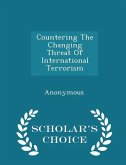The Routledge Handbook on Radicalisation and Countering Radicalisation
Herausgeber: Busher, Joel; Marsden, Sarah; Malkki, Leena
The Routledge Handbook on Radicalisation and Countering Radicalisation
Herausgeber: Busher, Joel; Marsden, Sarah; Malkki, Leena
- Broschiertes Buch
- Merkliste
- Auf die Merkliste
- Bewerten Bewerten
- Teilen
- Produkt teilen
- Produkterinnerung
- Produkterinnerung
This handbook provides a theoretical and methodological exploration of the research on radicalisation and counter-radicalisation, one of the most influential concepts in Security Studies, International Relations, and Peace and Conflict Studies.
Andere Kunden interessierten sich auch für
![The Routledge Handbook of Soft Power The Routledge Handbook of Soft Power]() The Routledge Handbook of Soft Power60,99 €
The Routledge Handbook of Soft Power60,99 €![The Routledge Handbook of the Political Economy of Sanctions The Routledge Handbook of the Political Economy of Sanctions]() The Routledge Handbook of the Political Economy of Sanctions60,99 €
The Routledge Handbook of the Political Economy of Sanctions60,99 €![Countering the Changing Threat of International Terrorism - Scholar's Choice Edition Countering the Changing Threat of International Terrorism - Scholar's Choice Edition]() Countering the Changing Threat of International Terrorism - Scholar's Choice Edition15,99 €
Countering the Changing Threat of International Terrorism - Scholar's Choice Edition15,99 €![Countering WMD: The Libyan Experience Countering WMD: The Libyan Experience]() Robert G. JosephCountering WMD: The Libyan Experience18,99 €
Robert G. JosephCountering WMD: The Libyan Experience18,99 €![Countering Propaganda in the Global War on Terrorism Countering Propaganda in the Global War on Terrorism]() Leesa J PapierCountering Propaganda in the Global War on Terrorism15,99 €
Leesa J PapierCountering Propaganda in the Global War on Terrorism15,99 €![The Routledge International Handbook of Morality, Cognition, and Emotion in China The Routledge International Handbook of Morality, Cognition, and Emotion in China]() The Routledge International Handbook of Morality, Cognition, and Emotion in China58,99 €
The Routledge International Handbook of Morality, Cognition, and Emotion in China58,99 €![Routledge Handbook of International Organization Routledge Handbook of International Organization]() Routledge Handbook of International Organization58,99 €
Routledge Handbook of International Organization58,99 €-
-
-
This handbook provides a theoretical and methodological exploration of the research on radicalisation and counter-radicalisation, one of the most influential concepts in Security Studies, International Relations, and Peace and Conflict Studies.
Produktdetails
- Produktdetails
- Verlag: Routledge
- Seitenzahl: 590
- Erscheinungstermin: 29. September 2025
- Englisch
- Abmessung: 244mm x 170mm x 32mm
- Gewicht: 1004g
- ISBN-13: 9781032573809
- ISBN-10: 1032573805
- Artikelnr.: 75242405
- Herstellerkennzeichnung
- Libri GmbH
- Europaallee 1
- 36244 Bad Hersfeld
- gpsr@libri.de
- Verlag: Routledge
- Seitenzahl: 590
- Erscheinungstermin: 29. September 2025
- Englisch
- Abmessung: 244mm x 170mm x 32mm
- Gewicht: 1004g
- ISBN-13: 9781032573809
- ISBN-10: 1032573805
- Artikelnr.: 75242405
- Herstellerkennzeichnung
- Libri GmbH
- Europaallee 1
- 36244 Bad Hersfeld
- gpsr@libri.de
Joel Busher is Professor of Political Sociology at the Institute for Peace and Security, Coventry University. He is co-editor of Researching the Far Right: Theory, Method and Practice (Routledge, 2021) and author of The Making of Anti-Muslim Protest (Routledge, 2016), which was awarded the British Sociological Association's Philip Abrams Memorial Prize. Leena Malkki is Director of the Centre for European Studies at the University of Helsinki. She is the chair of the ECPR Standing Group on Political Violence and a member of the editorial board of Terrorism and Political Violence. Sarah Marsden is Senior Lecturer in the School of International Relations at the University of St. Andrews. She is the author of Reintegrating Extremists: Deradicalisation and Disengagement.
1. 1. Introduction Part I: The History of Research on Radicalisation 2.
Before 'radicalisation': Explaining individual involvement in terrorism
before the popularisation of the radicalisation concept 3. 'Radicalisation'
and 'countering radicalisation': The emergence and expansion of a
contentious concept 4. Analysing 'radicalisation' in historical cases Part
II: Analytical Approaches to Radicalisation 5. The role of ideology in
radicalisation 6. Identity and Extremism: Sorting out the causal pathways
to radicalisation and violent self-sacrifice 7. Social movement theory and
research on radicalisation 8. Criminological perspectives on extremist
radicalisation and terrorist acts 9. Insights from the study of new
religious movements into the process of radicalisation 10. The pen and the
sword: Cognition, emotion, communication, and violent radicalisation 11.
Gender perspectives on radicalisation 12. Radicalisation and
psychopathology 13. Belonging is just a click away: Extremism,
radicalization, and the role of online communities 14. Radicalisation of
'lone actors' 15. Radicalisation of 'foreign fighters' Part III: Countering
Radicalisation: Key Debates 16. Countering violence or ideas? The politics
of counter-radicalisation 17. Responding to radicalisation with different
ideological roots: How similar is the 'problem'? How similar are the
'solutions'? 18. Who should be involved with counter radicalisation policy
and practice? 19. Working with communities to counter radicalisation 20.
The role of research and researchers in counter-radicalisation policy and
practice 21. How can we meaningfully evaluate the effects and effectiveness
of programmes to prevent or counter radicalisation? 22. Re-colonizing the
field of evaluation of prevention of violent radicalisation: A critical,
cross-regional perspective Part IV: Countering Radicalisation: Strategies
and Challenges 23. Rethinking CVE and public health prevention: Towards
health promotion 24. Multi-agency approaches to countering radicalisation
25. Naturalisation through mainstreaming: counter-terrorism and
counter-radicalisation in UN and EU discourse 26. Countering radicalisation
while expanding the criminal law 27. Responding to radicalisation through
education 28. Counter narratives and strategic communications, offline and
online 29. Deradicalisation and disengagement: Lessons from the Indonesian
experience 30. Interventions with 'at risk' individuals 31. How can general
violence risk assessment and management inform that of violent extremist
risk? 32. Content moderation: Social media and countering online
radicalisation 33. Radicalisation, counter-radicalisation and governance in
fragile states 34. Local contours and global discourses in countering
violent radicalization and extremism: A perspective from the Global South
Before 'radicalisation': Explaining individual involvement in terrorism
before the popularisation of the radicalisation concept 3. 'Radicalisation'
and 'countering radicalisation': The emergence and expansion of a
contentious concept 4. Analysing 'radicalisation' in historical cases Part
II: Analytical Approaches to Radicalisation 5. The role of ideology in
radicalisation 6. Identity and Extremism: Sorting out the causal pathways
to radicalisation and violent self-sacrifice 7. Social movement theory and
research on radicalisation 8. Criminological perspectives on extremist
radicalisation and terrorist acts 9. Insights from the study of new
religious movements into the process of radicalisation 10. The pen and the
sword: Cognition, emotion, communication, and violent radicalisation 11.
Gender perspectives on radicalisation 12. Radicalisation and
psychopathology 13. Belonging is just a click away: Extremism,
radicalization, and the role of online communities 14. Radicalisation of
'lone actors' 15. Radicalisation of 'foreign fighters' Part III: Countering
Radicalisation: Key Debates 16. Countering violence or ideas? The politics
of counter-radicalisation 17. Responding to radicalisation with different
ideological roots: How similar is the 'problem'? How similar are the
'solutions'? 18. Who should be involved with counter radicalisation policy
and practice? 19. Working with communities to counter radicalisation 20.
The role of research and researchers in counter-radicalisation policy and
practice 21. How can we meaningfully evaluate the effects and effectiveness
of programmes to prevent or counter radicalisation? 22. Re-colonizing the
field of evaluation of prevention of violent radicalisation: A critical,
cross-regional perspective Part IV: Countering Radicalisation: Strategies
and Challenges 23. Rethinking CVE and public health prevention: Towards
health promotion 24. Multi-agency approaches to countering radicalisation
25. Naturalisation through mainstreaming: counter-terrorism and
counter-radicalisation in UN and EU discourse 26. Countering radicalisation
while expanding the criminal law 27. Responding to radicalisation through
education 28. Counter narratives and strategic communications, offline and
online 29. Deradicalisation and disengagement: Lessons from the Indonesian
experience 30. Interventions with 'at risk' individuals 31. How can general
violence risk assessment and management inform that of violent extremist
risk? 32. Content moderation: Social media and countering online
radicalisation 33. Radicalisation, counter-radicalisation and governance in
fragile states 34. Local contours and global discourses in countering
violent radicalization and extremism: A perspective from the Global South
1. 1. Introduction Part I: The History of Research on Radicalisation 2.
Before 'radicalisation': Explaining individual involvement in terrorism
before the popularisation of the radicalisation concept 3. 'Radicalisation'
and 'countering radicalisation': The emergence and expansion of a
contentious concept 4. Analysing 'radicalisation' in historical cases Part
II: Analytical Approaches to Radicalisation 5. The role of ideology in
radicalisation 6. Identity and Extremism: Sorting out the causal pathways
to radicalisation and violent self-sacrifice 7. Social movement theory and
research on radicalisation 8. Criminological perspectives on extremist
radicalisation and terrorist acts 9. Insights from the study of new
religious movements into the process of radicalisation 10. The pen and the
sword: Cognition, emotion, communication, and violent radicalisation 11.
Gender perspectives on radicalisation 12. Radicalisation and
psychopathology 13. Belonging is just a click away: Extremism,
radicalization, and the role of online communities 14. Radicalisation of
'lone actors' 15. Radicalisation of 'foreign fighters' Part III: Countering
Radicalisation: Key Debates 16. Countering violence or ideas? The politics
of counter-radicalisation 17. Responding to radicalisation with different
ideological roots: How similar is the 'problem'? How similar are the
'solutions'? 18. Who should be involved with counter radicalisation policy
and practice? 19. Working with communities to counter radicalisation 20.
The role of research and researchers in counter-radicalisation policy and
practice 21. How can we meaningfully evaluate the effects and effectiveness
of programmes to prevent or counter radicalisation? 22. Re-colonizing the
field of evaluation of prevention of violent radicalisation: A critical,
cross-regional perspective Part IV: Countering Radicalisation: Strategies
and Challenges 23. Rethinking CVE and public health prevention: Towards
health promotion 24. Multi-agency approaches to countering radicalisation
25. Naturalisation through mainstreaming: counter-terrorism and
counter-radicalisation in UN and EU discourse 26. Countering radicalisation
while expanding the criminal law 27. Responding to radicalisation through
education 28. Counter narratives and strategic communications, offline and
online 29. Deradicalisation and disengagement: Lessons from the Indonesian
experience 30. Interventions with 'at risk' individuals 31. How can general
violence risk assessment and management inform that of violent extremist
risk? 32. Content moderation: Social media and countering online
radicalisation 33. Radicalisation, counter-radicalisation and governance in
fragile states 34. Local contours and global discourses in countering
violent radicalization and extremism: A perspective from the Global South
Before 'radicalisation': Explaining individual involvement in terrorism
before the popularisation of the radicalisation concept 3. 'Radicalisation'
and 'countering radicalisation': The emergence and expansion of a
contentious concept 4. Analysing 'radicalisation' in historical cases Part
II: Analytical Approaches to Radicalisation 5. The role of ideology in
radicalisation 6. Identity and Extremism: Sorting out the causal pathways
to radicalisation and violent self-sacrifice 7. Social movement theory and
research on radicalisation 8. Criminological perspectives on extremist
radicalisation and terrorist acts 9. Insights from the study of new
religious movements into the process of radicalisation 10. The pen and the
sword: Cognition, emotion, communication, and violent radicalisation 11.
Gender perspectives on radicalisation 12. Radicalisation and
psychopathology 13. Belonging is just a click away: Extremism,
radicalization, and the role of online communities 14. Radicalisation of
'lone actors' 15. Radicalisation of 'foreign fighters' Part III: Countering
Radicalisation: Key Debates 16. Countering violence or ideas? The politics
of counter-radicalisation 17. Responding to radicalisation with different
ideological roots: How similar is the 'problem'? How similar are the
'solutions'? 18. Who should be involved with counter radicalisation policy
and practice? 19. Working with communities to counter radicalisation 20.
The role of research and researchers in counter-radicalisation policy and
practice 21. How can we meaningfully evaluate the effects and effectiveness
of programmes to prevent or counter radicalisation? 22. Re-colonizing the
field of evaluation of prevention of violent radicalisation: A critical,
cross-regional perspective Part IV: Countering Radicalisation: Strategies
and Challenges 23. Rethinking CVE and public health prevention: Towards
health promotion 24. Multi-agency approaches to countering radicalisation
25. Naturalisation through mainstreaming: counter-terrorism and
counter-radicalisation in UN and EU discourse 26. Countering radicalisation
while expanding the criminal law 27. Responding to radicalisation through
education 28. Counter narratives and strategic communications, offline and
online 29. Deradicalisation and disengagement: Lessons from the Indonesian
experience 30. Interventions with 'at risk' individuals 31. How can general
violence risk assessment and management inform that of violent extremist
risk? 32. Content moderation: Social media and countering online
radicalisation 33. Radicalisation, counter-radicalisation and governance in
fragile states 34. Local contours and global discourses in countering
violent radicalization and extremism: A perspective from the Global South








